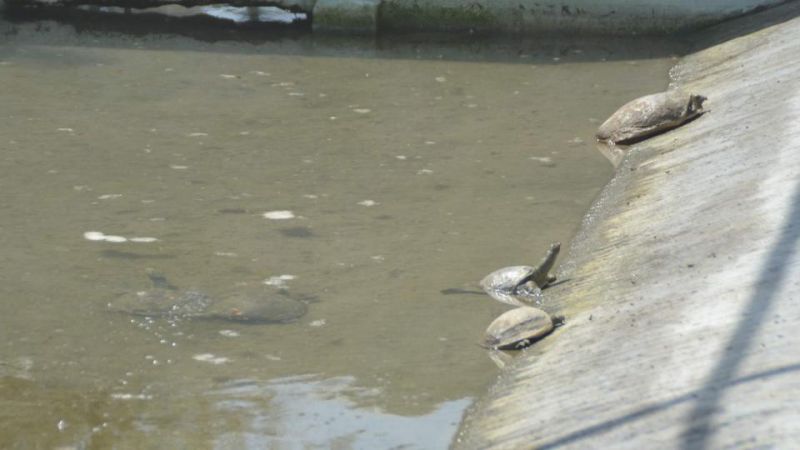Non-veg Turtles to Help in Ganga Cleaning
Published on by Water Network Research, Official research team of The Water Network in Government
Realising the importance of non-veg turtles, the forest department is planning to release around 500 of them in the river once they come of age, to help combat river pollution.

Softshell turtles eat organic waste, including burnt and half burnt corpses and
animal carcasses that are often dumped in Ganga. (HT Photo)
The Clean Ganga Mission now has a saviour - the seemingly nondescript, harmless non-vegetarian Indian turtle!
Hailing from the Chambal river, these non-vegetarian members of the reptile family—flapshell turtle (Lissemys punctata) and softshell turtle play a very crucial role in eating organic wastes, including burnt and half burnt corpses, animal carcasses that are often dumped into the Ganga.
Their vegetarian counterpart— narrow headed softshell turtle and black pond turtle also play an important role in cleaning the Ganga by feeding on flowers and leaves dumped in the river.
Realising the importance of these saviours, the forest department is planning to release around 500 non-vegetarian turtles in the river once they come of age. At present these hatchlings are being bred and raised at the Tortoise Rehabilitation Centre, Sarnath in Varanasi.
“Carnivorous turtles are found in plenty in Chambal area. Their eggs were brought in 2015. Around a year ago, turtle babies (hatchlings) came out. These babies are growing well under natural climatic conditions maintained in and around the hatching ponds have four-foot wide sand strip around as turtle babies like to dig pits and hole up there,” said ranger at forest department SK Singh who also heads the rehabilitation centre.
Water is sprinkled many times to maintain temperature of the sand that is suitable for turtles. Many hatchlings can be seen sitting at the pond’s bank. As soon as these babies attain the right age they will be released in the Ganga.
In the past too, the centre reared and released turtles in the river. But the number of vegetarian turtles outnumbered their non-vegetarian counterparts.
Speaking on the issue Singh said, “Carnivorous or non-vegetarian turtles are a very crucial part of aquatic life in Ganga since they feed upon the burnt and half burnt corpses that are immersed in the river that add to the pollution level of the national river.” He further said, the turtles also feed upon animal carcasses too and have been playing a crucial role in maintaining cleanliness of the Ganga for eternity.
Read more at: Hindustan Times
Media
Taxonomy
- Contaminant Removal
- River Studies
- Ecosystem Management
- River Engineering
- Aquatic Environment
- River Restoration
- Pollution
- Animal Health